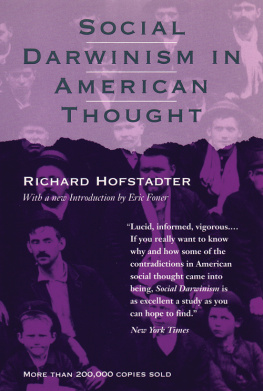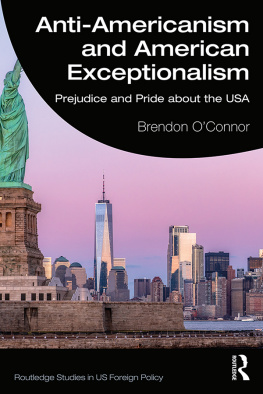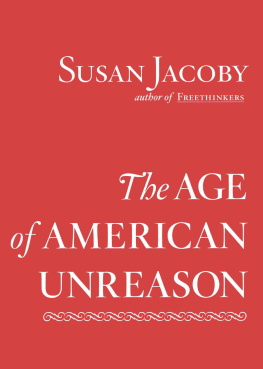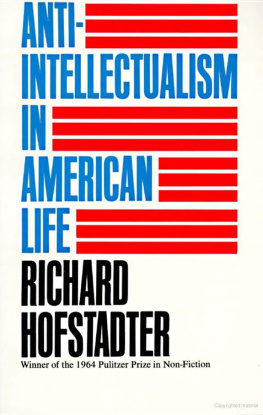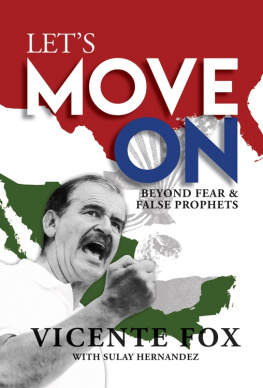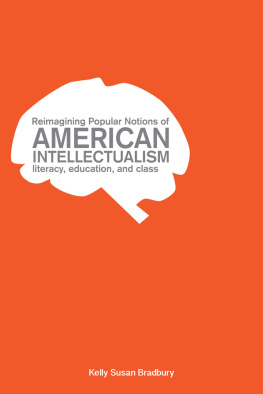Hofstadter Richard - Anti-Intellectualism in American Life
Here you can read online Hofstadter Richard - Anti-Intellectualism in American Life full text of the book (entire story) in english for free. Download pdf and epub, get meaning, cover and reviews about this ebook. year: 2011;1994, publisher: Knopf Doubleday Publishing Group, genre: Science. Description of the work, (preface) as well as reviews are available. Best literature library LitArk.com created for fans of good reading and offers a wide selection of genres:
Romance novel
Science fiction
Adventure
Detective
Science
History
Home and family
Prose
Art
Politics
Computer
Non-fiction
Religion
Business
Children
Humor
Choose a favorite category and find really read worthwhile books. Enjoy immersion in the world of imagination, feel the emotions of the characters or learn something new for yourself, make an fascinating discovery.

- Book:Anti-Intellectualism in American Life
- Author:
- Publisher:Knopf Doubleday Publishing Group
- Genre:
- Year:2011;1994
- Rating:4 / 5
- Favourites:Add to favourites
- Your mark:
- 80
- 1
- 2
- 3
- 4
- 5
Anti-Intellectualism in American Life: summary, description and annotation
We offer to read an annotation, description, summary or preface (depends on what the author of the book "Anti-Intellectualism in American Life" wrote himself). If you haven't found the necessary information about the book — write in the comments, we will try to find it.
Anti-Intellectualism in American Life was awarded the 1964 Pulitzer Prize in Non-Fiction. It is a book which throws light on many features of the American character. Its concern is not merely to portray the scorners of intellect in American life, but to say something about what the intellectual is, and can be, as a force in a democratic society.
Anti-Intellectualism in American Life — read online for free the complete book (whole text) full work
Below is the text of the book, divided by pages. System saving the place of the last page read, allows you to conveniently read the book "Anti-Intellectualism in American Life" online for free, without having to search again every time where you left off. Put a bookmark, and you can go to the page where you finished reading at any time.
Font size:
Interval:
Bookmark:
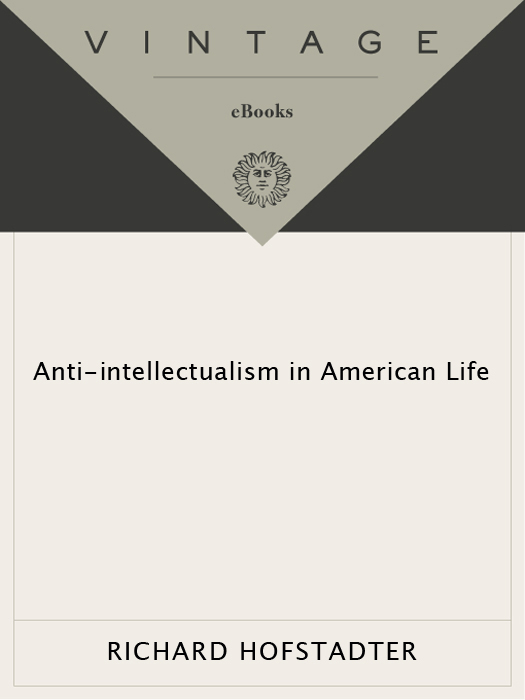
Richard Hofstadter
American Higher Education: A Documentary History
(WITH WILSON SMITH)
(1961)
The American Republic
(WITH DANIEL AARON AND WILLIAM MILLER)
(1959)
Great Issues in American History
(1958)
The United States
(WITH DANIEL AARON AND WILLIAM MILLER)
(1957)
The Age of Reform
(1955)
The Development of Academic Freedom in the United States
(WITH WALTER P. METZGER)
(1955)
The Development and Scope of Higher Education
in the United States
(WITH C. DEWITT HARDY)
(1952)
The American Political Tradition
(1948)
Social Darwinism in American Thought
(1944)
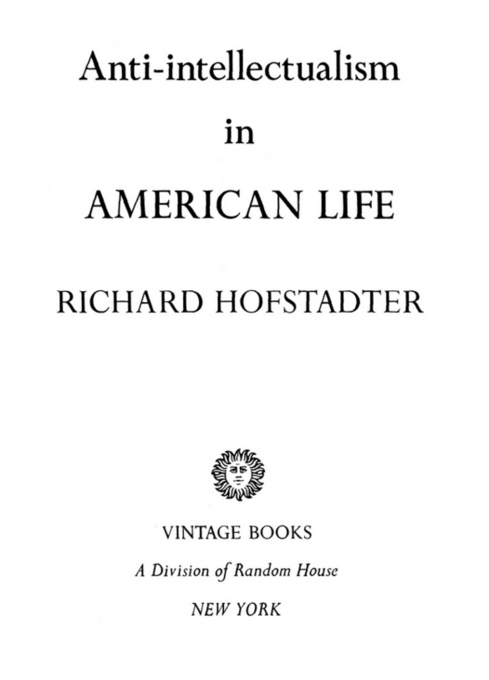
VINTAGE BOOKS
are published by Alfred A. Knopf, Inc.
and Random House, Inc.
Copyright1962, 1963 by Richard Hofstadter.
All rights reserved under International and Pan-American Copyright Conventions. Distributed in Canada by Random House Limited, Toronto.
appeared in somewhat different form as The Child and the World in Daedalus.
eISBN: 978-0-307-80967-4
v3.1
TO
E. A. H.
18881962

W HAT IS ordinarily done in prefaces I have tried to do in my first two chapters, which explain the origin and the intent of this book, as well as its central terms. But one thing should be particularly clear at the beginning: what I have done is merely to use the idea of anti-intellectualism as a device for looking at various aspects, hardly the most appealing, of American society and culture. Despite the fringes of documentation on many of its pages, this work is by no means a formal history but largely a personal book, whose factual details are organized and dominated by my views. The theme itself has been developed in a manner that is by choice rather impulsive and by necessity only fragmentary.
If one is to look at a society like ours from its nether end, so to speak, through scores of consecutive pages, one must resolve to risk wounding the national amour-propre, although this can only divert attention from the business at hand, which is to shed a little light on our cultural problems. One must resolve still more firmly to run some slight risk of encouraging the canting and self-righteous anti-Americanism that in Europe today so commonly masquerades as well-informed criticism of this country. For all their bragging and their hypersensitivity, Americans are, if not the most self-critical, at least the most anxiously self-conscious people in the world, forever concerned about the inadequacy of something or othertheir national morality, their national culture, their national purpose. This very uncertainty has given their intellectuals a critical function of special interest. The appropriation of some of this self-criticism by foreign ideologues for purposes that go beyond its original scope or intention is an inevitable hazard. But the possibility that a sound enterprise in self-correction may be overheard and misused is the poorest of reasons for suspending it. On this count I admire the spirit of Emerson, who wrote: Let us honestly state the facts. Our America has a bad name for superficialness. Great men, great nations, have not been boasters and buffoons, but perceivers of the terror of life, and have manned themselves to face it.
R. H .


Introduction
Anti-intellectualism in Our Time

A LTHOUGH this book deals mainly with certain aspects of the remoter American past, it was conceived in response to the political and intellectual conditions of the 1950s. During that decade the term anti-intellectualism, only rarely heard before, became a familiar part of our national vocabulary of self-recrimination and intramural abuse. In the past, American intellectuals were often discouraged or embittered by the national disrespect for mind, but it is hard to recall a time when large numbers of people outside the intellectual community shared their concern, or when self-criticism on this count took on the character of a nation-wide movement.
Primarily it was McCarthyism which aroused the fear that the critical mind was at a ruinous discount in this country. Of course, intellectuals were not the only targets of McCarthys constant detonationshe was after bigger gamebut intellectuals were in the line of fire, and it seemed to give special rejoicing to his followers when they were hit. His sorties against intellectuals and universities were emulated throughout the country by a host of less exalted inquisitors. Then, in the atmosphere of fervent malice and humorless imbecility stirred up by McCarthys barrage of accusations, the campaign of 1952 dramatized the contrast between intellect and philistinism in the opposing candidates. On one side was Adlai Stevenson, a politician of uncommon mind and style, whose appeal to intellectuals overshadowed anything in recent history. On the other was Dwight D. Eisenhower, conventional in mind, relatively inarticulate, harnessed to the unpalatable Nixon, and waging a campaign whose tone seemed to be set less by the general himself than by his running mate and the McCarthyite wing of his party.
Eisenhowers decisive victory was taken both by the intellectuals themselves and by their critics as a measure of their repudiation by America. Time, the weekly magazine of opinion, shook its head in an unconvincing imitation of concern. Eisenhowers victory, it said, discloses an alarming fact long suspected: there is a wide and unhealthy gap between the American intellectuals and the people. Arthur Schlesinger, Jr., in a mordant protest written soon after the election, found the intellectual in a situation he has not known for a generation. After twenty years of Democratic rule, during which the intellectual had been in the main understood and respected, business had come back into power, bringing with it the vulgarization which has been the almost invariable consequence of business supremacy. Now the intellectual, dismissed as an egghead, an oddity, would be governed by a party which had little use for or understanding of him, and would be made the scapegoat for everything from the income tax to the attack on Pearl Harbor. Anti-intellectualism, Schlesinger remarked, has long been the anti-Semitism of the businessman. The intellectual is on the run today in American society.
All this seemed to be amply justified when the new administration got under way. The replacement, in Stevensons phrase, of the New Dealers by the car dealers seemed to make final the repudiation of intellectuals and their valuesthey had already been overshadowed by the courthouse politicians of the Truman years. The country was now treated to Charles E. Wilsons sallies at pure research, to stories about Eisenhowers fondness for Western fiction as reading matter, and to his definition of an intellectual as a wordy and pretentious man. But during the Eisenhower administration the national mood reached a turning point: the McCarthyite rage, confronted by a Republican president, burned itself out; the senator from Wisconsin isolated himself, was censured, and deflated. Finally, in 1957, the launching of the Sputnik by the Soviets precipitated one of those periodic surges of self-conscious national reappraisal to which the American public is prone. The Sputnik was more than a shock to American national vanity: it brought an immense amount of attention to bear on the consequences of anti-intellectualism in the school system and in American life at large. Suddenly the national distaste for intellect appeared to be not just a disgrace but a hazard to survival. After assuming for some years that its main concern with teachers was to examine them for disloyalty, the nation now began to worry about their low salaries. Scientists, who had been saying for years that the growing obsession with security was demoralizing to research, suddenly found receptive listeners. Cries of protest against the slackness of American education, hitherto raised only by a small number of educational critics, were now taken up by television, mass magazines, businessmen, scientists, politicians, admirals, and university presidents, and soon swelled into a national chorus of self-reproach. Of course, all this did not immediately cause the vigilante mind to disappear, nor did it disperse anti-intellectualism as a force in American life; even in the sphere most immediately affected, that of education, the ruling passion of the public seemed to be for producing more Sputniks, not for developing more intellect, and some of the new rhetoric about education almost suggested that gifted children were to be regarded as resources in the cold war. But the atmosphere did change notably. In 1952 only intellectuals seemed much disturbed by the specter of anti-intellectualism; by 1958 the idea that this might be an important and even a dangerous national failing was persuasive to most thinking people.
Font size:
Interval:
Bookmark:
Similar books «Anti-Intellectualism in American Life»
Look at similar books to Anti-Intellectualism in American Life. We have selected literature similar in name and meaning in the hope of providing readers with more options to find new, interesting, not yet read works.
Discussion, reviews of the book Anti-Intellectualism in American Life and just readers' own opinions. Leave your comments, write what you think about the work, its meaning or the main characters. Specify what exactly you liked and what you didn't like, and why you think so.


